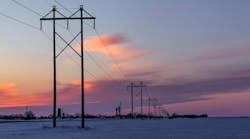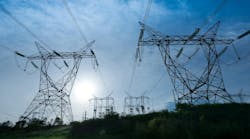American linemen are building transmission lines across the mountains in Ecuador, installing generators for hospitals in Africa and working on hydro-power projects in Third-World nations through Tech Serve. Over the last 20 years, this nonprofit organization has been sending linemen to help with overseas projects.
For many of these linemen, the volunteer projects have been a life-changing experience, says Tom Slatten, a volunteer for Tech Serve. “When they come back, they look at the world through a different set of eyes,” says Slatten, who worked for 35 years as an electrical engineer for Anaheim Public Utilities Co.
When the linemen travel to the countries, they often find that the local residents have dirt floors in their homes, no electricity, no cars and grow all their own food. By helping to provide electricity to remote villages, the linemen open up a new world to the men, women and children in the community.
Utility Work Overseas
Over the years, linemen have helped with a variety of different projects, from installing transformer banks to putting in transformers. Through these projects, the linemen have had the opportunity to gain experience, sharpen their skills and do line work the old-fashioned way, without using bucket trucks or other modern equipment.
By working for their utility companies in the United States, however, many linemen are equipped with the proper training to handle any challenge, whether it is at home or abroad. “If they're trained as a lineman, they'll have the right skills to do the job,” says Slatten.
How to Help
Tech Serve has about five projects going on simultaneously around the world with several more in the United States. While the organization does not have a utility project currently going on overseas, Slatten says linemen are definitely in demand for future volunteer work.
The organization keeps the names of about 2000 volunteers in its database. Each of these volunteers has a diverse skill set. While some of the volunteers — such as the linemen — are skilled workers, other Americans without a background in line construction can participate in a project as well.
After linemen call Tech Serve and complete an application, they become part of the volunteer database. When a volunteer project comes up that matches their skills, Tech Serve calls them to see if they are interested in participating.
On a transmission and distribution project, the engineering is generally done in the Tech Serve office, and then linemen and groundmen are sent to the site to assist with the installation.
When a group of linemen is sent to do a project either in the United States or abroad, they often work in a team of five to 20 people. It is a great way for them to build contacts and learn about other cultures, Slatten says.
“Many times, the linemen establish long-time friendships with the people they meet in different countries,” he says. “After they have completed the project, they often return to the area to see how the community is progressing.”
Giving Back
The linemen who participate in Tech Serve are not paid for their time, and they often commit to one week to six weeks or more abroad. When linemen install a generator for a hospital, it could take a week. Slatten remembers one project, however, in which a team of linemen spent six weeks building a 12-mile transmission line through the mountains in Ecuador.
In addition to serving overseas, linemen can also volunteer for a project in the United States. The U.S. volunteer jobs are mostly underground and require linemen to have experience splicing and grounding cable and installing vaults.
For example, Tim Hunter, a foreman for Westar Energy, volunteered for Tech Serve in the 1990s to install an underground system down the side of a mountain in Winter Park, Colorado. One day he would like to participate in a Tech Serve project in Honduras. He has visited the country twice on trips with his fellow church members, and he would like to return to Honduras to help them build their infrastructure. However, he says he would be interested in going wherever the organization needs his services.
Linemen are armed with skills, and they should give back to the less fortunate in Third-World countries, he says. “These countries don't have the infrastructure or the people to get the job done,” Hunter explains. “Linemen, masons and construction workers can help them to build medical clinics or orphanages.”
Volunteering for an overseas project is an experience linemen will never forget, and it's one that will be rewarding for years to come, he says. “Everyone has the opportunity to improve someone else's life,” comments Hunter. “I think it's part of what you should do. When you look back after you've given a part of yourself, it's great to see what good you've done. All it takes is a little bit of your time.”

